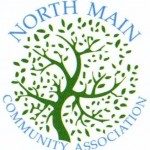
Annual Easter Egg Hunt
The Parks & Recreation Department will host easter egg hunts for children ages 2–4 and ages 5–8 at several community centers next week. Admission is free but all egg hunters must have a guardian on-site to complete a waiver. Masks are required for spectators and highly recommended for egg hunters.
 Wednesday, March 31 Nicholtown Community Center: Registration: 5 – 5:30 p.m. Egg Hunt: 5:30 – 6:30 p.m.
Wednesday, March 31 Nicholtown Community Center: Registration: 5 – 5:30 p.m. Egg Hunt: 5:30 – 6:30 p.m.
Thursday, April 1 David Hellams Community Center: Registration: 5 – 5:30 p.m. Egg Hunt: 5:30 – 6:30 p.m.
Thursday, April 1 West Greenville Community Center: Registration: 5 – 5:30 p.m. Egg Hunt: 5:30 – 6:30 p.m.
For more information, visit https://greenvillesc.gov/1820/Easter-Eggstravangza-2021.
Development Update and Other City News
- According to the Greenville Journal, earlier this week City Council postponed their six-month moratorium proposal and will now vote on the moratorium on April 26. The potential moratorium, if approved, would prohibit new construction for six months on new apartments and other commercial projects located near single-family homes in an attempt to slow down Greenville’s rapid growth. (Greenville Journal)
- The first structures are going up at Mohawk Forest (the name of the development on the 3.5 acres that was clear cut on Mohawk Drive). The plans are for 8 single family residences.
- The development on North Main just north of Park Ave. is called NoMa City Terrace. The goal is to open this spring. The 25 residences will also enjoy more than 535 additional sq ft of outdoor entertaining space. See their website for more information.
- Plans are moving forward at the Bobby Pearse Center. NMCA President Dave Modeen recently talked with the Project Manager and learned the following about status and scheduling.
-
- Completion schedule for all on-site work is the end of April, dependent on weather, supplies, etc. This includes parking lot and building. Usage by the beginning of the next school year is anticipated.
- Roof installation is complete.
- Plans include installation of gutters.
- Exterior siding should be completed soon.
- Flooring will be LVT (Luxury Vinyl Tile) – We understand this is an excellent choice for heavy traffic areas where durability is desired, withstanding spillage, flooding, etc. Perfect for after school care and exercise classes.
- The original flagpole was not able to be saved (in the demolition of peripheral materials due to size / weight of the concrete base surrounding it).
- As many of you know, Southeastern Grocers (SEG), Bi-Lo’s parent company, said in a June 3, 2020 press release that “The Company has made the strategic decision to no longer operate stores under the Bi-Lo banner to allow for greater investment in growing the Fresco y Más, Harveys Supermarket and Winn-Dixie banners.” According to the Greenville News, “SEG announced last summer that it would sell 46 Bi-Lo stores to Ahold Delhaize, which owns Food Lion. These stores — which includes 38 locations in South Carolina — began transitioning early this year and the transition will be completed by April.” The BiLo at Rutherford and Pleasantburg will be closing in late April and currently has 15% off all grocery items. There is reportedly no word on plans for this location.
- The Greenville Transit Authority is kicking off the design phase of the new Maintenance & Operations Facility with a drop-in style public meeting on Tuesday, March 30 from 5:30 to 7 p.m. at the Kroc Center (424 Westfield Street).
The meeting will include an overview of the project, including project guidelines and timeline, an introduction of the design team of architects and engineers who will be working on the project, and an opportunity for attendees to provide comments or concerns before the design process begins.
Information stations will be set up inside the Kroc Center’s Waggoner Conference Center and the public can visit any time between 5:30 p.m. and 7 p.m. There will not be a formal presentation. Meeting materials will be posted on the project webpage after the meeting and those who were unable to attend can provide comments by calling 864-467-4284 or emailing info@ridegreenlink.com.
For more information, visit RideGreenlink.com/BusGarage or contact Nicole McAden, Greenlink marketing and public affairs manager, at nmcaden@greenvillesc.gov or 864-298-2756.
Crime Corner
The Zone 2 Zoom meeting with the GPD on March 1 was short but there was good information exchanged. The consensus was that the community is happy with the services the police provide, their quick response and efforts to work with the community. Chief Thompson emphasized that they want to make sure they are doing all they can to improve communication with residents and ensure transparency.
For those not aware, the zones are based not on land area but on the number of service calls and time spent on calls. To see a map of the zones, go to https://police.greenvillesc.gov/1277/Neighborhoods
Lt. Michael Hammett is our go-to person. He covers Zone 2 which is the largest of the zones. In 2020, zone 2 had 16,000 calls. Calls are down this year by about 8.5% due to COVID. Accidents are down about 32%. Citations are down partly due to COVID. Warnings are up because officers are trying not to further burden people with citations depending on the situation. You may see cruisers in the neighborhood with steady blue lights. This is simply for visibility, so you AND criminals will know they are out there.
Auto break-ins are the number 1 problem and are on the rise. Almost 70% of these are unlocked or even left running when someone runs into a convenience store, etc. Criminals like areas where there are a large number of cars where they can check many doors quickly. Make sure you lock your car! If your car is broken into, even if nothing is taken, please report it! Forensics may be able to get information that will help in a future case.
Currently the GPD is at full staff with 209 officers. The city manager recently approved over-hire of 5 officers to decrease the lag time in getting someone back on the street when an officer is lost to retirement, etc.
One topic that was very interesting was Crime Prevention Through Environmental Design (CPTED). CPTED is a multi-disciplinary approach to deterring criminal behavior through environmental design, i.e. landscaping, lighting, and building design. Known in various places by the phrase “Design Out Crime,” CPTED is widely used around the world to deter crime in many different environments. In Greenville, you can call 864-467-6619 to schedule a free CPTED assessment for your property (business or residential). The police would prefer to be called BEFORE a structure is built so they can work with you ahead of time. They will be looking at the property from a different perspective than you will.
Make sure you keep Lt. Hammett’s contact information handy. His cell number is 520.7194. If it is not an urgent matter, you can leave a text message with any concerns or questions you may have. If it’s an emergency, please call 911. There is also a lot of information on the GPD website. To see what services they offer, go to https://police.greenvillesc.gov/160/Services
History of Greenville Fire Department
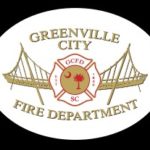 Early records show that the Greenville City Fire Department began somewhere around the year 1840 with an all-volunteer roster. These volunteer firefighters operated with one hand pumps commonly referred to as fire engines, and each engine was given a name. When the department’s first engine was named “Neptune,” the Neptune Fire
Early records show that the Greenville City Fire Department began somewhere around the year 1840 with an all-volunteer roster. These volunteer firefighters operated with one hand pumps commonly referred to as fire engines, and each engine was given a name. When the department’s first engine was named “Neptune,” the Neptune Fire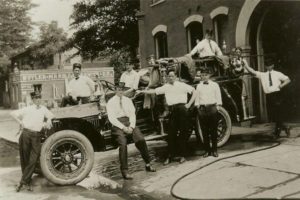 Company was born.
Company was born.
The first paid fire department was established on January 1, 1902 and consisted of a fire chief and 11 men. At that time, all of the paid firefighters were assigned to a fire station located on West McBee Avenue, next to City Hall. The paid fire department continued to be supported by two volunteer fire companies.
Today, the Greenville City Fire Department is no longer supported by volunteer firefighters. It is staffed by 157 professional firefighters assigned to seven (7) different fire stations strategically located throughout the city. https://www.greenvillesc.gov/1414/History
Did You Know?
National Agriculture Day was March 23. Ag Day recognizes and celebrates the abundance provided by agriculture… stewards of a healthy planet. A few generations ago, most Americans 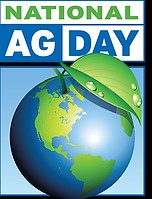 were directly involved in—or had relatives or friends involved in—agricultural-related endeavors. Today, that is no longer the case. The average American farmer feeds approximately 166 people worldwide! Their food brings everyone to the table.
were directly involved in—or had relatives or friends involved in—agricultural-related endeavors. Today, that is no longer the case. The average American farmer feeds approximately 166 people worldwide! Their food brings everyone to the table.
Agriculture is what feeds us, what clothes us and what keeps America, America. What happens when the farms of today no longer exist? Are we ready to pay the higher cost of imported foods which we will have no idea of how they were planted, grown or harvested? If you can, buy local! And help spread the word about the essential role of agriculture in maintaining a strong economy.
Tree Chemical Warfare
Many of you have probably had experience with plants just not doing well under or near walnut trees. This is because of a phenomenon known as allelopathy. For any plant, surviving and thriving are associated with capture and control of ecologically viable space, competition for essential inputs, and chemical coadaptation to the presence of other organisms and to site attributes.
 One of the oldest known and most noticeable allelopathic effects in trees occurs in walnut (Juglans spp.) associations. As early as 77 AD, the Juglans genera was cited by a Roman naturalist as having a poisonous effect on other plants. By far the chemical with the largest concentration, and one of the most toxic, usually present at >20 times more than all the other allelopathic materials in walnut, is juglone. Juglone exists within a tree in a non-toxic form called hydrojuglone. Only by exposure to air does juglone form. In the past people have made use of this color change. Boiled walnut husks have been used for ages to dye cloth and basket making materials to a dull brown color. It has also been used to dull the surface of shiny iron (a form of bluing). Extracting nut meats can leave hands and gloves stained from juglone formation. (Ever tried to get walnut stains off your car or concrete driveway?)
One of the oldest known and most noticeable allelopathic effects in trees occurs in walnut (Juglans spp.) associations. As early as 77 AD, the Juglans genera was cited by a Roman naturalist as having a poisonous effect on other plants. By far the chemical with the largest concentration, and one of the most toxic, usually present at >20 times more than all the other allelopathic materials in walnut, is juglone. Juglone exists within a tree in a non-toxic form called hydrojuglone. Only by exposure to air does juglone form. In the past people have made use of this color change. Boiled walnut husks have been used for ages to dye cloth and basket making materials to a dull brown color. It has also been used to dull the surface of shiny iron (a form of bluing). Extracting nut meats can leave hands and gloves stained from juglone formation. (Ever tried to get walnut stains off your car or concrete driveway?)
Juglone escapes from walnuts by several ways including: leaves falling and decaying; leakage from roots; in the husks of abscised fruit; and, by erosion from rain trickling over leaves and periderm. Juglone is dissolved only a small amount in water, but only a minute amount is needed to cause problems. Juglone remains in the soil surrounding walnut roots. Other plant roots that grow near walnut roots can be stunted or killed. Annual plants, garden vegetables, fruit trees, and some broad-leaf perennials can be severely damaged when juglone is in soil. Most grasses seem immune from juglone problems. When you consider how far a tree’s root system spreads (usually to the drip line or beyond), you realize how large the influence on surrounding plants can be. Some of the most susceptible plants include azaleas, rhododendron and mountain laurel. For more in-depth reading see this website. For a list of tolerant and susceptible plants, see this publication. Pecan trees also exhibit similar properties as walnuts, just not as strong.
March Gardening
Finally, it’s spring!! Daffodils and crocus are blooming and tulips are emerging. Buds on many shrubs and trees are starting to swell with color and some trees and shrubs are already leafing out. Hopefully we won’t have any cold snaps that could damage susceptible plants, including peach blossoms.
It’s not too late to plant woodies. But don’t wait much longer… the warmer it gets, the more the leaves that emerge demand of the root system. The idea of planting in the winter and early spring is to give the roots a chance to begin growing before they have to help sustain the top. Phosphorus fertilizer can help boost root growth.
It’s time for application of nitrogen for fescue, Bermuda grass and zoysiagrass lawns that have been overseeded for the winter. DON’T fertilize centipede or St. Augustine yet, nor warm-season lawns that were not overseeded. See Fertilizing Lawns for more information.
Remember that NMCA business member Daylily and Hosta Gardens at 2396 Roper Mountain Road will open for the season on weekends April through June. Fridays 12-6, Saturdays 9-4 and Sundays 12-6.
Closed Monday-Thursday. Closed Easter Sunday. Pet friendly garden – dogs welcome.
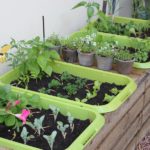 It’s also time to start thinking about a vegetable garden. If you don’t have a sunny spot in the yard for one, think containers. You can buy containers that you can put on wheels to roll in and out and which have a watering system incorporated into the design to keep moisture levels optimal. One example is the Earthbox but there are others very similar. There are any number of ways to container garden…get creative. Just remember that any plant in a container will dry out faster than those in the ground, so pay attention to watering.
It’s also time to start thinking about a vegetable garden. If you don’t have a sunny spot in the yard for one, think containers. You can buy containers that you can put on wheels to roll in and out and which have a watering system incorporated into the design to keep moisture levels optimal. One example is the Earthbox but there are others very similar. There are any number of ways to container garden…get creative. Just remember that any plant in a container will dry out faster than those in the ground, so pay attention to watering.
For a list of March/April gardening chores, go to https://www.ggmga.org/marapr-garden-chores.html
The Piedmont Plant & Flower Sale at the Greenville State Farmers Market is scheduled for April 29 – May 2. Thursday – Saturday: 8 am – 6 pm. Sunday: 10 am – 4 pm. Piedmont COVID-19 Plan
Save the date for the Upstate Native Plant Nursery’s Spring Sale which will be held this year from Saturday April 10th through Saturday May 8th. The all-volunteer team has been working very hard over the winter getting plants ready for the sale, and they expect to have around 5,000 plants including almost 150 species including ferns, grasses, perennials, shrubs, trees and vines available this year in several sizes.
The plant price list will be posted on the SCNPS Website by April 1st so you can begin your ‘wish list’ early. They’ll begin accepting orders by e-mail from SCNPS members on Tuesday April 6th, and for the general public on Saturday April 10th. Orders will be pulled and confirmed upon receipt of payment online, and due to the ongoing pandemic, they’ll be continuing their ‘low-contact’ pick-up program at the nursery. Limited appointments may be made for shopping in person as well.
What is That Plant??
Got a plant you can’t identify? The SC Native Plant Society can help. Send a photo of the plant along with the other information requested on this webpage. They’ll let the experts take a look at it and post the results (or an educated guess) on their “Identified Plants” page!
*** Please submit requests and photos of plants growing in the wild… no potted houseplants or nursery plants.
You may also want to check Name That Plant, a native plant identification website created by SC Native Plant Society member Janie Marlow. Click here to view recently identified plants.
For the Birds
 Mid-March marks the return of ruby-throated hummingbirds to the Upstate. So get those hummingbird feeders out and cleaned out so you’ll be ready. Hummingbirds fly by day when nectar sources such as flowers are more abundant. Flying low allows the birds to see, and stop at, food supplies along the way. They are also experts at using tail winds to help reach their destination faster and by consuming less energy and body fat. Research indicates a hummingbird can travel as much as 23 miles in one day. To see a migration map go to 2021 hummingbird spring migration map, 2021 hummingbird sightings, migration patterns, migration times (hummingbirdcentral.com)
Mid-March marks the return of ruby-throated hummingbirds to the Upstate. So get those hummingbird feeders out and cleaned out so you’ll be ready. Hummingbirds fly by day when nectar sources such as flowers are more abundant. Flying low allows the birds to see, and stop at, food supplies along the way. They are also experts at using tail winds to help reach their destination faster and by consuming less energy and body fat. Research indicates a hummingbird can travel as much as 23 miles in one day. To see a migration map go to 2021 hummingbird spring migration map, 2021 hummingbird sightings, migration patterns, migration times (hummingbirdcentral.com)
Spring is also when we’ll be seeing baby birds and other baby wildlife, so it’s time to get those nest boxes cleaned out and repaired. Check out this website for tips on when and how to clean. We’re also seeing more goldfinches and they are getting colorful, as are most male birds as mating season is almost upon us.
DNR has been reporting dead and sick songbirds, particularly pine siskins, in SC and other states, suggesting a widespread disease outbreak, most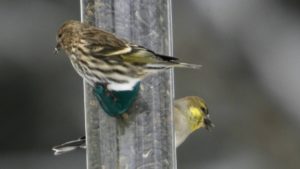 likely Salmonella. “Sick birds may appear thin, fluffed up, depressed, have swollen eyelids or may have trouble passing waste,” a North Carolina Wildlife Resources Commission release said. “They are often lethargic and easy to approach.” Bird feeders are dirty places. When birds congregate to them day after day without the feeder being cleaned, it can become a perfect environment for salmonella. “Keeping bird feeders clean, and temporarily removing them for the next few weeks, is something people can do to help keep birds safe.” https://www.thestate.com/news/state/south-carolina/article249811433.html
likely Salmonella. “Sick birds may appear thin, fluffed up, depressed, have swollen eyelids or may have trouble passing waste,” a North Carolina Wildlife Resources Commission release said. “They are often lethargic and easy to approach.” Bird feeders are dirty places. When birds congregate to them day after day without the feeder being cleaned, it can become a perfect environment for salmonella. “Keeping bird feeders clean, and temporarily removing them for the next few weeks, is something people can do to help keep birds safe.” https://www.thestate.com/news/state/south-carolina/article249811433.html
Weather Tidbits
According to climate data from 1884 to the present, the average maximum temperature for Greenville in March is 65°F, and the average low is 41°F. Average precipitation is 4.52”. The maximum high was 91 on March 23, 1901. The maximum low temperature was 65 on March 30, 1896. The minimum high temperature was 27 on March 2, 1980 and the minimum low was 11 the next day and also on March 15,1993. Maximum precipitation (rain) in a 24-hour period was 5.35” on March 26th, 1901. Maximum snow was 9.4” on March 13, 1993. Data for April shows an average high of 73 and an average low of 48. Average rainfall is 3.36”. The max high was 94 on the 20th back in 1917 and the max low was 40 on the 8th in 1907. The max low was 70 on the 29th in 1894 and the min low was 22 on the 14th and 15th in 1907. Max daily rainfall was 3.34” on April 29, 1963. There was actually a trace of snow on April 3 in 1987. http://www.dnr.sc.gov/climate/sco/index.php .
The 3-month forecast (April, May, June) calls for a 50% – 60% chance of higher than normal temperatures and average precipitation.
February 2020 was the 9th wettest February on record for Greenville with 9.98” of rain. February 28 set a record for the warmest low temp in Feb at 68°F. Feb 15 ranked 4th for coldest low temp at 19°F. March 17 ranked third for the warmest low temp at 69.
Do you know the difference between an equinox and a solstice? There are only two times of the year when the Earth’s axis is tilted neither toward nor away from the sun, resulting in a “nearly” equal amount of daylight and darkness at all latitudes. These events are referred to as Equinoxes. The vernal (or spring) equinox happened on March 20. The autumnal equinox will occur on September 22. The summer solstice occurs at the moment the earth’s tilt toward the sun is at a maximum. Therefore, on the day of the summer solstice, the sun appears at its highest elevation with a noontime position that changes very little for several days before and after the summer solstice…this year on Jun 21. The winter solstice will be on December 21.

For Our Four-Legged Friends
Mark your calendars for Saturday, May 8, for GCAC Tails & Trails 5K at 8:30am at Conestee Park. Race the trails (or go for a casual stroll) at Conestee Park side by side with your best running partner – your dog! Whether you’re racing with or without your four-legged companion or just walking the trail to support a good cause, Tails & Trails is fun for everyone. Go to this site to register or learn more.
If you have already registered for Tails & Trails 5K in 2020, your registration will carry over to the 2021 event. We cannot predict the factors surrounding CODIV-19 and therefore cannot guarantee that Tails & Trails will take place in 2021. While we fully intend to host a 2021 event, in the case that a participant registers and the race does not take place, the ticket cost will still be used for the same purpose, saving lives!
As many families prepare to celebrate Easter, it’s important to keep in mind the many hazards it poses for our furry friends. Here are the top four most common Easter Dangers, presented by the ASPCA Animal Poison Control Center (APCC).
- Chocolate. Chocolate can cause gastrointestinal upset, pancreatitis, stimulation to the nervous system (hyperactivity, tremors and seizures) and elevation in heart rate. Not all chocolate is
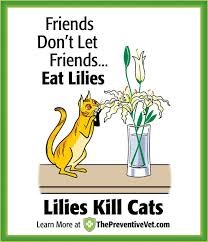 created equally—the darker the chocolate, the more dangerous it is for pets. Other ingredients to keep out of your pet’s reach include raisins, macadamia nuts, xylitol and alcohol.
created equally—the darker the chocolate, the more dangerous it is for pets. Other ingredients to keep out of your pet’s reach include raisins, macadamia nuts, xylitol and alcohol. - Plastic Easter Grass. Pets cannot absorb plastic Easter grass into their bodies, which means that it can become lodged in the gastrointestinal tract and wreak havoc if consumed. Signs for concern include vomiting, diarrhea, decrease in appetite, lethargy and stomach pain. Consider using shredded colored paper or some other material if you have pets.
- Plants. Many plants can cause issues for pets, but during this time of year, the APCC sees an uptick in calls about Lilies and bulbs that bloom in spring. Lilies (Lilium sp and Hemerocallis sp, which includes daylilies) can cause serious concerns for our feline friends. Exposure to any parts of the plant can result in kidney injury and gastrointestinal upset.
- Fertilizers and Herbicides. Many people begin gardening and yardwork on Easter weekend, including the use of fertilizers and herbicides. Make sure these are stored where pets can’t chew or puncture the bottle and keep pets indoors while applying the products. Always follow label instructions and wait to let your pet out again until the product has been watered in or the ground is dry.
If you think that your pet may have ingested a potentially poisonous substance, call your veterinarian or the ASPCA Poison Control Center at (888) 426-4435 immediately.

Shop Local
 Keep your dollars in your community. The following companies are committed to preserving the beauty and economic well-being of the North Main Community and the greater Greenville area. Please thank them and give them your business when you can. Hover your mouse over each company name to read a brief description or click to go to their website:
Keep your dollars in your community. The following companies are committed to preserving the beauty and economic well-being of the North Main Community and the greater Greenville area. Please thank them and give them your business when you can. Hover your mouse over each company name to read a brief description or click to go to their website:
Small businesses have been hurt by the COVID pandemic and are still struggling as customers are still slow to feel comfortable to shop or dine inside. Please continue to support our small and local businesses as much as possible. Thank you!
Gardening and Plants
- Bonnie Berry Garden Design (864.449.5234)
- Dahlia a Florist (864.232.0112)
- Daylily and Hosta Gardens (864.297.9043)
- Plant & Tree Solutions (864.601.5115)
- Schneider Tree Care (864.244.3088)
Law Firms/CPAs/Financial
- Barrett-MacKenzie, LLC (864.232.6247)
- Christophillis & Gallivan, P.A. (864.233.4445)
- Curry, P.A. (864.855.5621)
- Global View Investment Advisors, LLC. (864.272.0818)
- Holmes Law Firm (864.271.2381)
- Jason Elliott Law Firm (864.235.5308)
- Kehl Culbertson Andrighetti, LLC (864.370.8222)
- Law Office of Christine Howard (864.282.8575)
- Pope, Smith, Brown & King (864.242.0656)
- The Carolina Law Group (864.312.4444)
Insurance
Retail/Home Décor
- ATH Interiors, LLC. (864.520-1600)
- Dodson Dig Co. (864.626.3299)
- Gary Hester Interiors (864.232.4975)
- McDunn Woodworking Studio (864.242.0311)
- MarbleLife of the Carolinas (888.627.2530)
- Nicholson Stained Glass (864.235.8650)
- The Personal Touch Cleaning Service of Greenville (864.294.0102).
Realtors
- Allen Tate Realtors (864.386.3180)
- Berkshire Hathaway | C. Dan Joyner (864.244.9111)
- Central Realty Holdings (864.250.9407)
- Coldwell Banker Caine – Angela Reid (864.350.6670)
- GreatUpstate Properties@Keller Williams Greenville Central (864.448.4169)
- Griffin Property Solutions, LLC (GPS) (877.477.1407)
- Keller Williams Upstate: Tara Pickens (864.901.9644)
- Lil Glenn Company, LLC (864.242.0088)
- Pam Childress: BHHS C. Dan Joyner (864.201.8832)
- Rhett Brown |The Marchant Co (864.915.9393)
- Southland Properties (864.313.6825)
- The Haro Group of Keller Williams (864.312.6424)
- The Marchant Company (864.467.0085)
- Wilson Associates Real Estate (864.640.8700)
Food/Drink/Catering
- The Bohemian Cafe (864.233.0006)
- Coffee Underground (864.298.0494)
- Drop-in Store (864.242.0111)
- Greenco Beverage (864.242.1464)
- Hall of Fame Sports Grill (864.346.8378)
- Henry’s Smokehouse (864.232.7774)
- Ji-Roz Restaurant (864.373.9445)
- Naked Pasta (864.283.5844)
- Northgate Soda Shop (864.235.6770)
- Swamp Rabbit Cafe and Grocery (864.255.3385)
- The Community Tap (864.631.2525)
- The Universal Joint (864.252.4055)
Personal Health/Well Being
- Arrive’e (864.275.2084)
- Greenville Dental Studio (864. 520-2942)
- Dance Ventures at Stone Plaza (864.271.7701)
- Escape Artist Greenville (864.509.9305)
- Fellowship Bible Church (864.255.9520)
- Gateway House, Inc. (864.242.9193)
- Integrative Health Partners (864.365.6156)
- Julie Thaxton, Mary Kay – Senior Beauty Consultant (864.616.8150)
- New View Counseling (941.751.8003)
- Northside United Methodist Church (864.233.8359)
- Stone Plaza Pharmacy (864.233.7940)
Home Improvement/Builders/Architects
- 3D Land Surveying, Inc. (864.272.0274)
- CarolinaCrafted Construction, LLC (864.449.1779)
- Corley Plumbing Air Electric (864.908-3377)
- Darrohn Engineering, LLC (864.346.2170)
- Greenville Remodeling and Restoration (864.484.3007)
- Jordan Wholesale Lumber Co. (864.232.9686)
- JWK Design, LLC (864.214.5323)
- O’Leary Cole, Inc. (864.233.1606)
- Preferred Choice Heating & Air (864.233.8001)
- Priority One Security (864-346-5351)
- Ryan Miller Builders (864.303.8103)
- Royal Engineering, Inc. (864.235-4425)
- UBuildIt (864.676.1113)
Miscellaneous Professional Services
- Brainstorm Signs (864.377.4264)
- Cuddly Critters Pet Sitting (864.901.3189)
- Deb Sofield (864.275.8877)
- North Main Neighbors (864.630.9931)
- Palmetto Plating Company (864.859.9314)
- Propel HR (800.446.6567)
- Redhype (864.232.2000)
- Servpro of West Greenville (864.275.1548)
- Sunnie and DeWorken Group (864.905.5529)
If you would like to see your company listed here, please join the NMCA today! Businesses do not have to be located in the North Main Neighborhood. They only need to provide services to North Main residents.
Calendar
City Council Formal Meeting and Work Session schedules can be found at http://www.greenvillesc.gov/city_government/meet.asp City meetings are now virtual and we will try to keep you alerted to those of interest.
Artisphere returns this spring, heralding a ‘re-opening’ of downtown Greenville
The festival will take place on its usual Mother’s Day weekend, May 7-9. Due to COVID-19, it will be a gated event to control crowd flow and confined completely within the West End historic district along South Main Street, Artisphere executive director Kerry Murphy said.
Greenville County Museum of Art – The GCMA will continue to be closed while it completes several planned building projects. Funded through a bond issue approved by Greenville County Council in 2019, these critical updates will ensure the protection of our community’s valuable art collection and enhance our visitor experience. Museum staff continue to work on site, developing educational programs and publications and planning exhibitions and events.
March 29- Vietnam Veterans Memorial. 11:00 AM - 12:00 PM @ Vietnam Memorial in Cleveland Park. 1 hour observance of Veterans Day at Cleveland Park.
April 7 – Sound Check Concert Series. Live music returns with Greenville Heritage Sound Check presented by Pepsi Zero Sugar. The socially distanced concert series will be held on Wednesdays from 6 to 9 p.m. April 7 through September 29 in the Peace Center Amphitheatre. Space will be limited, and reservations will be required. The admission cost will be $10 for a T-Mobile Safe Space Pod, which can accommodate up to four people. Beverage delivery service will also be available. (Note: the April 7 event may already be sold out.)
Coolers, tents and outside drinks will not be permitted but event guests are encouraged to bring chairs and/or blankets for use in the pods. Pets will not be allowed on the event site.
The City will follow the guidelines established by state and federal public health officials regarding social distancing and sanitation, including spacing pods six feet apart and providing hand sanitizing stations throughout the site. Face coverings will also be required when not drinking or eating. Individuals who are unable to wear a face covering can reserve one of two specially designated pods. Tickets for the April 7 concert are available now. To reserve tickets, visit https://www.greenvillesc.gov/1814/Greenville-Heritage-Sound-Check.
April 10 – May 8 – Upstate Native Plant Nursery’s Spring Sale. See article earlier in newsletter for more info.
April 17 – May 1. Reedy River Cleanup. Get your family or your quaranteam together to do a cleanup in your chosen location, at a time that is convenient for you within the timeframe of April 17 – May 1! Your cleanup can be on land or water, in your neighborhood, park, trail, etc. – anywhere that there may be trash! Click here for more info.
April 29 – May 2 – The Piedmont Plant & Flower Sale at the Greenville State Farmers Market.. Thursday – Saturday: 8 am – 6 pm. Sunday: 10 am – 4 pm. Piedmont COVID-19 Plan
May 1, 2021, 8:00 AM - 12:00 PM. TD Saturday Market. On Saturday mornings from the beginning of May until the end of October, two blocks of downtown Greenville’s Main Street are transformed into the TD Saturday Market. The market features over 75 vendors selling the season’s freshest produce and the area’s most original and high-quality crafts.
The North Main Community Association does not give, sell, or otherwise distribute your email or other information to third parties.
The use of trade names or advertisements in this publication does not constitute endorsement or discrimination by the North Main Community Association.
